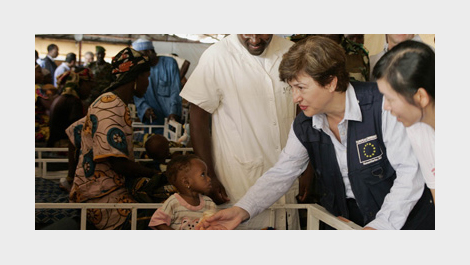17/01/2012
-
The European Union's Humanitarian Aid Commissioner Kristalina Georgieva arrives in Niger today amid a looming crisis in Africa's Sahel region. The Commissioner is responding to calls for assistance from the affected countries.
During a four-day visit to the region she will visit Niger and Chad, two of the five Sahel countries (the others being Burkina Faso, Mali and Mauritania) most at risk of major food shortages.
'Nobody should have to live in fear of famine yet within months people here will starve unless we act,' said the Commissioner. 'This is the third time in a decade that this region has fallen into crisis. We have saved the lives of more than 200 000 children but we must and will go further.'
The Commissioner said that, as for the last major crisis in 2010, by anticipating the worst effects of the looming food shortages and acting before they strike more lives would be saved. 'I am here this week to make sure that we deliver smart aid, targeting the most vulnerable in the most cost-effective and efficient way.'
She will be evaluating humanitarian needs with the authorities as well as the European Commission's response to the crisis, and identifying the potential areas for further assistance.
Commissioner Georgieva added: 'The Commission has provided more than €225 million since 2005. But we want to go further and break the cycle of hunger. In the current crisis we've already allocated more than €100 million to fight hunger and we are working closely with other agencies to build a comprehensive aid strategy to cover both the short and long-term actions required to make malnutrition history.'
Approximately 22.9 million people in the Sahel are beginning 2012 with huge uncertainty about how they will feed themselves and their families. Most people who live in the Sahel are heavily dependent on rain-fed agriculture and livestock for survival. Food production deficits are as high as 52% in comparison to last year, while an estimated 1.3 million children in the region are currently suffering from acute severe malnutrition.


